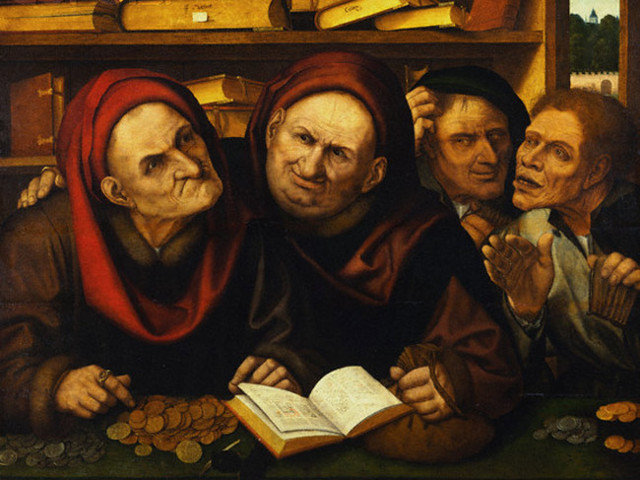Got Choices?

Government and Money
Government debt represents an obligation taken on collectively by the citizens of a nation. Imagine a nation with a million people borrows a billion dollars. At some point, the government will have to pay that money back by raising taxes by $1000 for each of its 1 million citizens. And this does not include the interest charges which have been incurred as a result of the borrowing.
People with common sense recognize, this may not always be practical. It only works if the economy is growing at such a robust rate that it can withstand the burden of the additional taxation. Otherwise, the cycle of increased spending and declining revenues will continue, and there is no reason to think the debt can ever be fully repaid.
In our modern era, this problem has often been dealt with through a process of cyclical inflation and borrowing. In later chapters we will explore in more detail such things as fractional banking, fiat money and deficit spending. But for now, it is enough to understand that a centralized banking authority can assert a great deal of control over how much money there is in circulation at any given time. By lending to government, they can create new money without your knowledge or consent–money that is backed, or guaranteed by your labor.
Government can then spend that money to provide generous entitlements to the people whose votes they need in order to retain their office. This results in two things: inflation and increasing public debt. Both, at their root, constitute involuntary servitude, or a form of slavery by degrees.
Inflation happens when government borrows money, inflating the money supply beyond what the natural economy would have. This phenomenon is not always well understood by the people. Some think they don’t need to worry about government debt because they know the government can just create more money to pay off any debt it incurs. And why not? If there is more money around, there is more for me and more for you, right? Unfortunately that is not how it works.
Remember, we discussed how resources are naturally scarce in a world of entropy. It takes work to create the valuable assets we depend on for the maintenance of our lives. We can create money as an abstract representation of that value. But the total value of our money, in real terms, will always be less than the sum of all the actual goods and potential for services still existing in our economy at any given time.
In other words, the money derives its value from the real commodities we own–our houses, cars, food and so forth. It also derives value from our willingness to go to work each day and earn money to pay taxes and repay loans. When extra money is created in a forced or unnatural way, it’s value becomes diluted because it doesn’t have our full faith and backing. Each dollar becomes worth less over time in terms of the goods and services it can purchase.
As money loses its value, it can not be depended on as a store of value so people begin to lose confidence in it. Eventually this can cause a monetary crisis where the money system itself fails. When that happens, trading with each other becomes much more difficult and commerce grinds to a halt. While there may be goods and services available, people are unwilling to accept money in exchange for them. So the process of moving products to the people who need them to live and survive can not be carried out as efficiently.
The fact that new government debt can be incurred without the informed consent of the governed means government can consign you to an obligation of servitude without you choosing it. Since government debt is backed by tax collections and you are a tax payer, you are on the hook to work for as long as it takes to continue servicing the ongoing debt. Since you are at the mercy of a banking authority who determines the value of each dollar, you don’t really have much control over the process at all. You become a slave, ever laboring to serve a system you have no control over.
This all seems pretty grim. Is there no way around it? We have looked at a range of different systems of government, and each one seems to devolve into a mode where one group or class eventually becomes the servants of another class. And this is not just an economic theory. Our observations throughout history have also shown us it is true.
There likely is no perfect form of government. Remember, the world is governed by force, and we live in an entropic condition where work is required in order to survive. It is more efficient to take what we need from others who have produced it than it is to produce everything ourselves. So left unchecked, these factors combine to create an environment where producers work in perpetual servitude and their parasite masters enjoy the fruits of their labors.
How is it these governing elites manage to retain their power? How are they able to maintain control when the large majority of their constituents become the victims of their misguided promises? Why do we put up with it? If most of us really are Good people, then how to we fall into this cycle of one class attempting to prey upon the labors of another?
In spite of the fact that the great majority of us are Good people in our hearts, we are still subject to the realities of our existence. We get hungry, we get tired and often, we get lonely. It turns out to be a lot of work to stay alive and functioning in an entropic world. And it takes more work to do it on our own than it does when we can take advantage of the labors of others.
The fact is, the whole job of providing for ourselves can create stress in our lives. We can feel a lot more comfortable if we find ways to reduce that stress. Now, imagine someone tells you he will give you some things you want or need for free. Why would you ever object to that? What could be wrong with receiving more of what you and your family need without having to work any more than you already do? What could be Bad about that?
So who is this new friend of yours–the person who promises to give you a bunch of stuff for free? Most likely he is your friendly, neighborhood elected official. And what he really wants and needs is your vote.
In order to get it, he is focused like a laser on the things you want and need. And he is going to find a way to get them for you. All you have to do is get him into office and keep him there.
Both of you are probably Good people so no one really wants to think too hard about where all the free things will come from. If people really understood that, most would probably decide to just do the work to produce it themselves.
Instead, they may seek to justify their actions to make them seem more compatible with their values:
“It should be our right to have all those things. After all, everyone needs food, water and shelter in order to survive. Why shouldn’t we be entitled to these things? If government has a way to get them and make sure everyone receives his share, then why not do it? And why stop there? Life is so much better with a good education and a free doctor to take care of us when we get sick. It seems like we should have a right to those things too.”
Maybe we do understand the freebies will first have to be taken from someone else, but we convince ourselves we will only take it from Bad people. They have more than they deserve in the first place. So it is OK to use the power of government to take it by force and give it to others, including me and you. What could be wrong with that?
And so the age-old commodity of involuntary human service is cleaned up, repackaged and sold to a public largely consisting of otherwise Good people. We are divided into opposing classes, right and left, young and old, rich and poor, black and white. And we get sold on the idea that our team is right, the other team is wrong, and government will set things straight. All too often, otherwise Good people buy into it.
Are politicians all Bad people? Of course not. They too get hungry and tired and lonely. They too need to feel good about themselves and what they do in order to sustain and perpetuate their own lives. Maybe a few are cynically aware that everything they give out must first be harvested by force from otherwise free people. But most believe they are justified. Most ideally hope what they take is coming from people who didn’t deserve it in the first place. And they hope it is being distributed to people who really are entitled to it. But in the end, many are not shy about extracting what they want for their own maintenance as money flows from a producing class to an entitlement class.
What very few of us probably realize, at least until it is too late, is that productivity comes only from one place–we, the producers. We go to work and do a job each day to produce the things that are in demand–things that sustain and improve the quality of our lives. And when government starts handing out free goods and services, those who work will eventually end up footing the bill.
Like it or not, this burden of production usually falls upon those who are struggling the hardest: the working poor and middle class.
